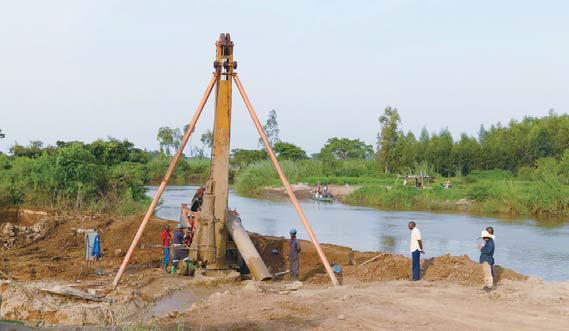COVEC bridges local concerns over Nzoia River

When China Overseas Engineering Group Co Ltd was named the winner of the Sigiri Bridge project in March 2015, everyone involved in the project was surprised because the company had submitted not the cheapest price but the fifth-lowest bid for the job.
While many Chinese companies in Africa have gained a reputation for efficiency and good prices, COVEC officials say the company was entrusted with building it because of its reputation for quality work.
The project has great importance locally as the construction was prompted by a tragedy.
| Construction site of the Sigiri Bridge project. Liu Hongjie / China Daily |
The bridge project includes a 100-meter-long steel structure across the Nzoia River in western Kenya and about 1.5 kilometers in asphalt road on each side.
The 257-kilometer-long Nzoia runs across Busia County and eventually flows into Lake Victoria near the town of Port Victoria.
In the Sigiri area, the river separates Sigiri village and Port Victoria from Madeya village. People in Madeya village on the south bank had to take canoes to cross the river for business and shopping in Busia. Using a car to cross upstream means an extra half-hour of travel.
In September 2014, a canoe capsized in Sigiri, claiming nine lives. Canoes, used for many years, had become increasingly risky, especially with floods during the rainy season. The Kenyan government called for the construction of a bridge over the river to curb the loss of lives.
The contract for the project was signed on July 1, 2015. Unlike many other Chinese government-aided projects in Africa, the project, with a total contractual value of about 1 billion Kenyan shillings ($9.9 million), is a pure commercial deal funded by Kenya's government.
COVEC has abundant experience in project building and management in Kenya and around Africa, company officials say.
Construction of the project is proceeding smoothly, with the roadbed on one side of the river already in place and several bridge piers drilled.
"COVEC was one of the earliest Chinese engineering companies in Africa. It has built up its reputations in the previous projects," says Zhu He, the project manager for COVEC.
The company also once subcontracted a construction project in Juba, capital of South Sudan, from a Japanese company and the quality of the project also helped build its fame, officials say.
Zhu says the Sigiri project also won lots of support from local residents. While claiming the land for roadbed, residents agreed without hesitation as long as COVEC said they will be compensated, Zhu says.
Local Member of Parliament Ababu Namwamba is a prominent opposition leader. He is well known for his sharp criticism of the Kenyan government, but on the Sigiri project he took a different approach.
"I know the people of Budalang'i in Busia would want me to work with the president and other leaders to improve their welfare, and that is what I intend to do," Namwamba says.
He says he considered the construction of the Sigiri Bridge a top priority for his constituency and expressed confidence that Kenyan President Uhuru Kenyatta will ensure it is built.
The construction of the project also has resulted in jobs for local people. Currently, more than 60 residents have been hired at the construction site, while there are 19 Chinese workers.
liuhongjie@chinadaily.com.cn
(China Daily Africa Weekly 08/19/2016 page27)
Today's Top News
- Crossing a milestone in the journey called Sinology
- Chinese, Russian media outlets urged to enhance cooperation
- Where mobility will drive China and the West
- HK community strongly supports Lai's conviction
- Japan paying high price for PM's rhetoric
- Japan's move to mislead public firmly opposed































